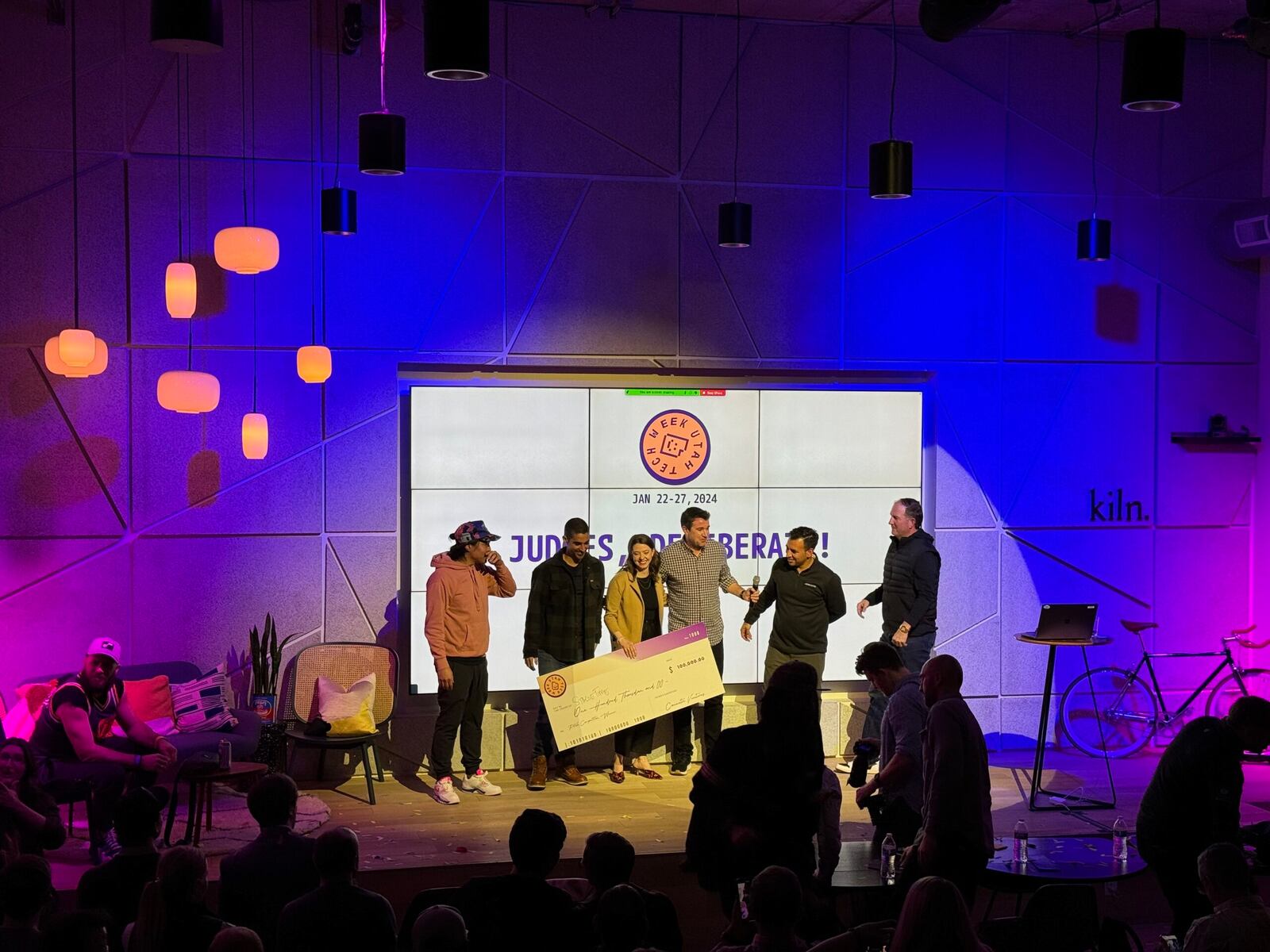Every seat in the Kiln auditorium—and the overflow foyer—was packed on Monday night as five Utah-based founders pitched for $100K at the second annual Utah Tech Week Pitch Competition.
In the end, one company won the praise of the judges and the oversized $100,000 check: Stagetime, a professional hiring solution targeting the live performing arts space. The runner-up and winner of $25,000 was Neighborbrite, an AI-first home services marketplace that helps homeowners with their projects from the inspiration stage to budgeting and execution.
With Stagetime, founder and CEO Jennie Moser hopes to solve one of the performing arts industry’s primary problems. Professionals are in a constant state of hiring, she says, and before Stagetime, no central digital location aggregated talent in one place.
“Because these contracts last for three to maybe six weeks, we see that hirers are essentially always looking for their talent, and talent is always keeping an eye on their next job,” said Moser, who is also a professional opera singer, during her pitch.
Stagetime enables industry members—be they individual talent, hiring managers or booking agents—to create portfolio pages containing crucial information like location, availability, citizenship, race, pronouns, visa status and more. Portfolio pages are hosted on Stagetime, which allows industry professionals to connect with one another easily.
“Our business model focuses on returning this very particular data to the people who need it most, and they need it all the time,” Moser said, citing that there are currently 3 million performing arts professionals freelancing in the United States market alone.
Rob Hennefer, co-founder and partner at Frame VC and one of the judges of the pitch competition, says he marked Stagetime as his top choice before Moser even completed her pitch.
“I think Stagetime is a phenomenal company doing the types of things that I’m really interested in focusing on—an unsung but really big market, and taking offline processes and putting them online,” he says.
In addition to Hennefer, this year’s judging panel comprised seven other knowledgeable individuals of the human variety—Ben Lopez of Mercato Partners, Entrepreneur-in-Residence for the State of Utah Brad Bonham, Kat Kennedy of Kickstart Fund, Gaby Porras of Signal Peak Ventures, Chris Hjelm of Connetic Ventures, Brent Hill of Origin Ventures, Cory Cozzens of Philo Ventures—and one AI VC analyst, Wendal, which uses cloud-based technology to gather data, communicate with company founders, analyze financial data and rank companies.
Tyler Slater, the winner of last year’s Utah Tech Week Pitch Competition and the founder of Nonsense—a language learning app that helps users learn a language using their favorite Hollywood movies—addressed the crowd at Kiln while the judges deliberated their decision. Winning last year’s pitch competition was a springboard for his company’s success, he said.
“Since last year, we’ve closed content deals for movies from NBCUniversal and Lionsgate studios in Hollywood, and we’re actually launching this week,” Slater said. “We brought on an awesome designer, one of the top three designers from Netflix. We’ve been testing with small numbers of users while waiting for our licensing. We’ve seen people retain two years every day on the app, so we’re super excited to get this thing launched.”
For Stagetime, the future is similarly looking bright. The platform already has 10,000 active users and a pipeline of paid enterprise accounts, including the National Symphony Orchestra, the Opera Theatre of Saint Louis and Austria’s Wiener Staatsoper.
“2024 is crucial for us. This was wildly serendipitous timing,” Moser says of winning the pitch competition. “I felt for a while that the business was really well-positioned for its next phase. We’ve had a lot of excitement from the organizations I idolized growing up as a performer. To have some of them step in and begin to pay enterprise level for the product is exciting, but to take that from a handful of companies to being ubiquitous throughout the industry is a totally different order, and that’s what this funding is going to allow us to do.”

